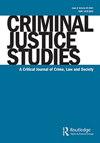The trouble with squads: accounting for corruption in Australia’s specialist policing units
IF 1.1
Q3 OPERATIONS RESEARCH & MANAGEMENT SCIENCE
引用次数: 2
Abstract
ABSTRACT The specialist squad is a common aspect of modern intelligence-led policing. Officers seconded to such units learn from the institutional knowledge and experience in a certain area of enforcement, allowing them to develop an expertise that enables proactive policing. While the utility of specialist squads is clear, the vulnerability of officers attached to them to become involved in corruption is also high. Corruption research argues that officers in squads are at risk of engaging in misconduct for a variety of reasons, such as the low visibility of their work and the necessity of building relationships with criminal actors. The history of police corruption in Australia supports this theory, with a range of examples of corruption in specialist squads to be found across the country. From an historical criminology perspective, this article explores the corruption in Australia’s specialist squads to discuss why risk factors were not addressed despite being consistently identified in the past. It also looks at attempts by police administrators and governments to deal with corruption in specialist squads, evaluating the efficiency of these strategies with a view to informing future anticorruption measures.小分队的麻烦在于:澳大利亚专业警察部门的腐败问题
专家小组是现代情报主导警务的一个常见方面。借调到这类单位的警务人员可以学习机构在某一执法领域的知识和经验,使他们能够发展积极主动的警务专业知识。虽然专业小组的效用显而易见,但隶属于他们的官员卷入腐败的可能性也很高。腐败研究认为,由于各种原因,班组的警官有从事不当行为的风险,比如他们的工作不为人所知,以及与犯罪行为者建立关系的必要性。澳大利亚警察腐败的历史支持了这一理论,在全国各地都能找到一系列专门小组腐败的例子。从历史犯罪学的角度来看,本文探讨了澳大利亚专业小组的腐败问题,以讨论为什么风险因素没有得到解决,尽管过去一直被确定。它还研究了警察管理者和政府在专门小组中处理腐败问题的努力,评估了这些策略的效率,以期为未来的反腐败措施提供信息。
本文章由计算机程序翻译,如有差异,请以英文原文为准。
求助全文
约1分钟内获得全文
求助全文
来源期刊

CRIMINAL JUSTICE STUDIES
OPERATIONS RESEARCH & MANAGEMENT SCIENCE-
CiteScore
2.80
自引率
5.60%
发文量
17
期刊介绍:
Criminal Justice Studies, a quarterly refereed journal, publishes articles that deal with substantive criminal justice and criminological issues. The journal welcomes all articles that are relevant to the issue of criminal justice, as well as those that may be outside the field but have relevancy to the topic of criminal justice. Articles that cover public administration, issues of public policy, as well as public affairs issues are welcome. The journal also publishes relevant literature reviews, research notes and summary reports of innovative research projects in criminal justice. Qualitative and quantifiable articles are sought mainly from academics and researchers in the field, though articles from professionals will also be considered.
 求助内容:
求助内容: 应助结果提醒方式:
应助结果提醒方式:


